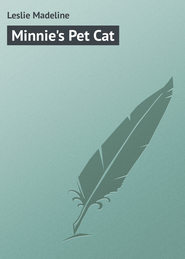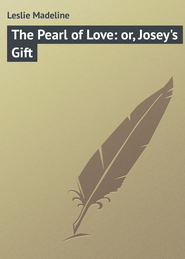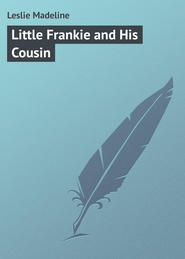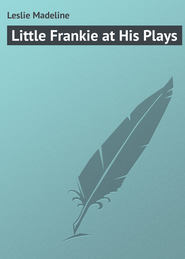По всем вопросам обращайтесь на: info@litportal.ru
(©) 2003-2025.
✖
The Pearl of Peace: or, The Little Peacemaker
Настройки чтения
Размер шрифта
Высота строк
Поля
The Pearl of Peace: or, The Little Peacemaker
Madeline Leslie
Leslie Madeline
The Pearl of Peace; or, The Little Peacemaker
CHAPTER I
THE QUARREL
SHE'S the meanest girl I ever saw! If she is my cousin, I'll say so. I wont speak to her again this term; see if I do!"
Sallie Munson was greatly excited, and walked in quick jerks by the side of her companion.
Matilda had been repeating to her, with some exaggeration, the remarks of Cynthia Manning, concerning her dress; but Matilda did not expect or intend to excite so much anger, and was almost frightened at Sallie's warmth.
"What are you talking about?" called a cheerful voice from behind. "I've been running my breath all away, trying to catch you; but I couldn't make you hear my call; I could only see Sallie gesturing away, as if she were practising her exhibition piece."
Matilda had only time to whisper hurriedly, "Don't tell her a word of what I said," when Harriet Maynard joined them.
One glance into her good-humored, serene face, would have put Sallie's anger to flight, if it had not been for a sly pinch Matilda gave her arm.
"Did you ever see the brook look so lovely, girls? I should have overtaken you sooner, only that I stopped at the bridge to see the water dash over Montworth Falls, as I have named that pretty cascade. I threw in a piece of wood, and over it went among the foam just like that boat we read of, over Niagara."
She rattled away in a gay tone, looking as smiling as a May Queen; but at last she could not help noticing that neither of her companions were in good humor.
"Why, what's the matter, Sallie?" she asked, affectionately. "You look as if you were in a high fever, and Matilda, too, is as solemn as a church. What is it?"
There was no answer; and, presently, a shadow crept over Hatty's smiling countenance.
"Sallie, Matilda," she exclaimed, eagerly, "you must tell. Have I done anything? Have I hurt your feelings?"
"No; oh, no, indeed!" answered Sallie, turning quickly to her friend. "It's nothing that you have anything to do with." She cast a quick glance down at her own dress, eager to know whether Hatty had also condemned it as low and vulgar; but her friend said, still more earnestly, —
"Tell me all about it, can't you? Do you know I begin to be jealous of Matilda? You have told her all your troubles."
"No, indeed! Matilda told me, – I" —
There was another pinch of the arm, and she stopped suddenly.
"Well, good-bye, then; I wish you were going my way: but I have the brook for company."
Then she laughingly waved her adieu, calling out after they were at some distance, "I've finished all those hard sums."
"What a girl Hatty is," exclaimed Sallie. "I wish I were always as happy as she is. I don't believe she ever cried in her life."
"Yes, she's gay," answered Matilda, "and good company; but still I do like people that have some feeling. She laughs a good deal. She knows that's her best look. She's awful proud of her white teeth."
"Now, Matilda, that's too bad! I don't believe she ever thinks of that in all her life. She laughs because she's happy; and, as for feeling, I think she has more than any of us. She's the best friend I have, any way. I never get angry when I'm with her."
"I didn't mean to say a word against her, I'm sure. I like her first-rate."
"Well, I shouldn't think you liked me first-rate, if I heard that you called me unfeeling and proud."
Sallie drew her arm from her companion, and walked on by herself in a dignified manner. Before long, Matilda reached her own home, and, with a pleasant good-bye, ran inside the gate.
When Sallie was left to her own reflections, her face grew more flushed and serious than ever. She was very angry with her cousin Cynthia, for criticizing her dress. She was angry with her mother, for obliging her to wear a gown that looked as if it came out of the ark. She was angry with Matilda for repeating her cousin's ill-natured remarks; and she was angry with herself for listening to them. It was only when she thought of Hatty, sweet Hatty Maynard, with her gay tone and pleasant, placid smile, that her forehead relaxed from the deep frown which had gathered upon it.
"I wonder," she said to herself, "why Hatty is so much happier than anybody else I know. She's real poor, and has to wait on that cross old uncle, and her deformed sister; she dresses old-fashioned, too; only she never seems to care. When she has on anything odd, she just laughs the more, and says, gayly, —
"'You know my dressmaker doesn't visit the city often.' Well, I suppose it's her way, and I wish 'twas my way, too."
CHAPTER II
SALLIE'S HOME TROUBLES
SALLIE MUNSON was the daughter of a man who had sailed as Captain of a schooner, bound for the West Indies, more than five years before the date of our story. He left a wife and seven children, of whom Sallie was the youngest, and the only daughter. At the time he left home she was just past six, and was therefore now eleven.
Five long, weary, waiting years of watching, suspense and anxiety, had left Mrs. Munson careworn and old before her time. Her eldest son was married and settled at a distance; the second had gone with his father as a sailor; the sixth boy, her darling, blue-eyed Jamie, was buried at the end of her little garden; leaving four children dependant on her labor for their support. To be sure, Abner, the oldest at home, was nearly seventeen; but though steady and honest, he lacked energy and thrift. When away from home he was the butt and laughing-stock of his more shrewd companions; and so his patient mother obtained what employment she could for him, under her own eye, and sent his brother Joseph, a stout, fun-loving lad of fifteen, to work in a neighboring tan yard.
Edward and Sallie went to school during the short sessions both in summer and winter, though the care and pains it cost their mother to fit them out in clothes and books, I can hardly describe.
Once a year Mrs. Barnes, the Captain's sister, came to the sea-shore to spend a few days, and always brought with her a bundle of half-worn clothes, out of which the widow made useful, if not fashionable, garments for her family.
It was shortly after one of these visits, that Sallie wore to school a dress, made from one given her by her aunt. It was a bright plaid, and with great pains had been made to fit her neatly. Whether the boddice and sleeves were in the prevailing mode, she was ignorant, until informed by her school-mate, Matilda.
This young girl had some good traits of character. She was diligent in her studies, and prompt in obliging a friend. But she had one terrible failing; a love of gossip or mischief-making, which rendered her dangerous to the peace of those with whom she associated.
This habit often led her much farther than she anticipated, and betrayed her into sundry exaggerations which she sometimes keenly regretted.
At recess, Cynthia Manning refused to lend a new book to Matilda; and to show her spite, she determined to make a quarrel between the cousins. The two girls lived not far apart, and usually walked home together in company with Hatty.
This time Matilda hurried her friend along, and began at once to say:
"It's strange you can't have anything new, without Cynthia being so envious. Just because you've got a handsome new gown, she's so mad, she can't say enough against it. She made all manner of fun of it behind your back, and called it real dowdy. 'I do declare,' she said, tossing back her head, 'for all Sallie is so set up with her new dress, I wouldn't be seen wearing such a vulgar-looking thing.'"
This was what had made Sallie exclaim in anger against her cousin. The reason Matilda was unwilling her companion should explain why she looked feverish, was because she well knew Hatty's character as a peace-maker; and her conscience loudly whispered that she had told much more than was true.
After the girls parted, and she went into her own home, do you think she was happy? Are quarrelsome people generally so? We shall see.
Matilda was the eldest of five children. The baby, as Master Tom, a sturdy little fellow of two years was called, was playing near the steps as she walked up the path from the gate. He gave a shout of welcome; but she pushed over his pile of stones with her foot, laughed at his cry of disappointment, and opened the door, with a frown on her face.
It was Wednesday; and the afternoon was a holiday. She felt quite sure there would be no play for her, and was resolved to show her displeasure at once.
She threw her pile of books into a chair, tossed her hat on another, and, passing through the common sitting-room, asked in a complaining tone, —
"Isn't dinner most ready?"
"Oh, Matilda!" said her mother, "you're just in time; run back as quick as you can to the store, and ask Mr. Pratt to cut you a thick slice of ham. Your father will be home in ten minutes, and be angry if dinner isn't ready. There, catch up your hat, and run quick."
Madeline Leslie
Leslie Madeline
The Pearl of Peace; or, The Little Peacemaker
CHAPTER I
THE QUARREL
SHE'S the meanest girl I ever saw! If she is my cousin, I'll say so. I wont speak to her again this term; see if I do!"
Sallie Munson was greatly excited, and walked in quick jerks by the side of her companion.
Matilda had been repeating to her, with some exaggeration, the remarks of Cynthia Manning, concerning her dress; but Matilda did not expect or intend to excite so much anger, and was almost frightened at Sallie's warmth.
"What are you talking about?" called a cheerful voice from behind. "I've been running my breath all away, trying to catch you; but I couldn't make you hear my call; I could only see Sallie gesturing away, as if she were practising her exhibition piece."
Matilda had only time to whisper hurriedly, "Don't tell her a word of what I said," when Harriet Maynard joined them.
One glance into her good-humored, serene face, would have put Sallie's anger to flight, if it had not been for a sly pinch Matilda gave her arm.
"Did you ever see the brook look so lovely, girls? I should have overtaken you sooner, only that I stopped at the bridge to see the water dash over Montworth Falls, as I have named that pretty cascade. I threw in a piece of wood, and over it went among the foam just like that boat we read of, over Niagara."
She rattled away in a gay tone, looking as smiling as a May Queen; but at last she could not help noticing that neither of her companions were in good humor.
"Why, what's the matter, Sallie?" she asked, affectionately. "You look as if you were in a high fever, and Matilda, too, is as solemn as a church. What is it?"
There was no answer; and, presently, a shadow crept over Hatty's smiling countenance.
"Sallie, Matilda," she exclaimed, eagerly, "you must tell. Have I done anything? Have I hurt your feelings?"
"No; oh, no, indeed!" answered Sallie, turning quickly to her friend. "It's nothing that you have anything to do with." She cast a quick glance down at her own dress, eager to know whether Hatty had also condemned it as low and vulgar; but her friend said, still more earnestly, —
"Tell me all about it, can't you? Do you know I begin to be jealous of Matilda? You have told her all your troubles."
"No, indeed! Matilda told me, – I" —
There was another pinch of the arm, and she stopped suddenly.
"Well, good-bye, then; I wish you were going my way: but I have the brook for company."
Then she laughingly waved her adieu, calling out after they were at some distance, "I've finished all those hard sums."
"What a girl Hatty is," exclaimed Sallie. "I wish I were always as happy as she is. I don't believe she ever cried in her life."
"Yes, she's gay," answered Matilda, "and good company; but still I do like people that have some feeling. She laughs a good deal. She knows that's her best look. She's awful proud of her white teeth."
"Now, Matilda, that's too bad! I don't believe she ever thinks of that in all her life. She laughs because she's happy; and, as for feeling, I think she has more than any of us. She's the best friend I have, any way. I never get angry when I'm with her."
"I didn't mean to say a word against her, I'm sure. I like her first-rate."
"Well, I shouldn't think you liked me first-rate, if I heard that you called me unfeeling and proud."
Sallie drew her arm from her companion, and walked on by herself in a dignified manner. Before long, Matilda reached her own home, and, with a pleasant good-bye, ran inside the gate.
When Sallie was left to her own reflections, her face grew more flushed and serious than ever. She was very angry with her cousin Cynthia, for criticizing her dress. She was angry with her mother, for obliging her to wear a gown that looked as if it came out of the ark. She was angry with Matilda for repeating her cousin's ill-natured remarks; and she was angry with herself for listening to them. It was only when she thought of Hatty, sweet Hatty Maynard, with her gay tone and pleasant, placid smile, that her forehead relaxed from the deep frown which had gathered upon it.
"I wonder," she said to herself, "why Hatty is so much happier than anybody else I know. She's real poor, and has to wait on that cross old uncle, and her deformed sister; she dresses old-fashioned, too; only she never seems to care. When she has on anything odd, she just laughs the more, and says, gayly, —
"'You know my dressmaker doesn't visit the city often.' Well, I suppose it's her way, and I wish 'twas my way, too."
CHAPTER II
SALLIE'S HOME TROUBLES
SALLIE MUNSON was the daughter of a man who had sailed as Captain of a schooner, bound for the West Indies, more than five years before the date of our story. He left a wife and seven children, of whom Sallie was the youngest, and the only daughter. At the time he left home she was just past six, and was therefore now eleven.
Five long, weary, waiting years of watching, suspense and anxiety, had left Mrs. Munson careworn and old before her time. Her eldest son was married and settled at a distance; the second had gone with his father as a sailor; the sixth boy, her darling, blue-eyed Jamie, was buried at the end of her little garden; leaving four children dependant on her labor for their support. To be sure, Abner, the oldest at home, was nearly seventeen; but though steady and honest, he lacked energy and thrift. When away from home he was the butt and laughing-stock of his more shrewd companions; and so his patient mother obtained what employment she could for him, under her own eye, and sent his brother Joseph, a stout, fun-loving lad of fifteen, to work in a neighboring tan yard.
Edward and Sallie went to school during the short sessions both in summer and winter, though the care and pains it cost their mother to fit them out in clothes and books, I can hardly describe.
Once a year Mrs. Barnes, the Captain's sister, came to the sea-shore to spend a few days, and always brought with her a bundle of half-worn clothes, out of which the widow made useful, if not fashionable, garments for her family.
It was shortly after one of these visits, that Sallie wore to school a dress, made from one given her by her aunt. It was a bright plaid, and with great pains had been made to fit her neatly. Whether the boddice and sleeves were in the prevailing mode, she was ignorant, until informed by her school-mate, Matilda.
This young girl had some good traits of character. She was diligent in her studies, and prompt in obliging a friend. But she had one terrible failing; a love of gossip or mischief-making, which rendered her dangerous to the peace of those with whom she associated.
This habit often led her much farther than she anticipated, and betrayed her into sundry exaggerations which she sometimes keenly regretted.
At recess, Cynthia Manning refused to lend a new book to Matilda; and to show her spite, she determined to make a quarrel between the cousins. The two girls lived not far apart, and usually walked home together in company with Hatty.
This time Matilda hurried her friend along, and began at once to say:
"It's strange you can't have anything new, without Cynthia being so envious. Just because you've got a handsome new gown, she's so mad, she can't say enough against it. She made all manner of fun of it behind your back, and called it real dowdy. 'I do declare,' she said, tossing back her head, 'for all Sallie is so set up with her new dress, I wouldn't be seen wearing such a vulgar-looking thing.'"
This was what had made Sallie exclaim in anger against her cousin. The reason Matilda was unwilling her companion should explain why she looked feverish, was because she well knew Hatty's character as a peace-maker; and her conscience loudly whispered that she had told much more than was true.
After the girls parted, and she went into her own home, do you think she was happy? Are quarrelsome people generally so? We shall see.
Matilda was the eldest of five children. The baby, as Master Tom, a sturdy little fellow of two years was called, was playing near the steps as she walked up the path from the gate. He gave a shout of welcome; but she pushed over his pile of stones with her foot, laughed at his cry of disappointment, and opened the door, with a frown on her face.
It was Wednesday; and the afternoon was a holiday. She felt quite sure there would be no play for her, and was resolved to show her displeasure at once.
She threw her pile of books into a chair, tossed her hat on another, and, passing through the common sitting-room, asked in a complaining tone, —
"Isn't dinner most ready?"
"Oh, Matilda!" said her mother, "you're just in time; run back as quick as you can to the store, and ask Mr. Pratt to cut you a thick slice of ham. Your father will be home in ten minutes, and be angry if dinner isn't ready. There, catch up your hat, and run quick."











